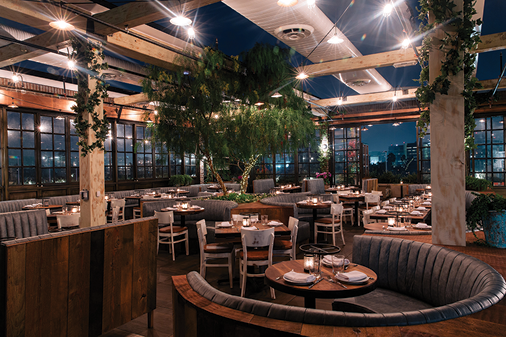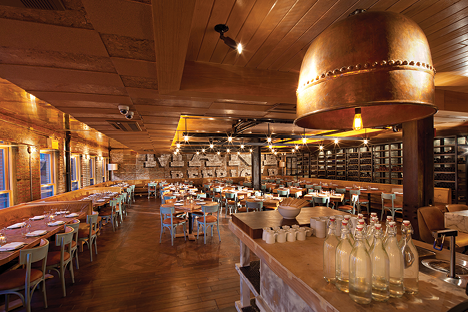- Home
- Media Kit
- Current Issue
- Past Issues
- Ad Specs-Submission
- Ad Print Settings
- Reprints (PDF)
- Photo Specifications (PDF)
- Contact Us

![]()
ONLINE

Creating Experiences
Editors’ Note
Dubbed by Forbes as one of the “New Kings of New York Hospitality,” Eugene Remm and his partner, Mark Birnbaum, have developed a dynamic portfolio of successful venues. Most recently, Remm co-founded Rumble, a boxing-inspired group fitness concept.
Company Brief
Restaurant and nightlife veterans Eugene Remm and Mark Birnbaum founded EMM Group (emmgrp.com) in 2006 and have since built it into one of the country’s most successful hospitality management companies. Identifying a need for establishments that offer multiple experiences within the same property, EMM Group has introduced synergy between restaurants and nightlife, opening venues that create seamless transitions between dining and entertainment. Today, EMM Group owns and operates a portfolio of properties that includes refined American bistro Lexington Brass and multiple outposts of the globally influenced, seafood-centric CATCH, where they continue to pioneer dynamic hospitality experiences while shifting focus to the ongoing domestic and international expansion of the brand. With its multilevel flagship located in the heart of New York City’s Meatpacking District, current CATCH outposts include Dubai, Playa del Carmen, and Los Angeles, where their 12,000-square-foot rooftop restaurant opened September 2016.
Will you discuss the opportunity you saw when you created EMM?
It was super simple when we first started in 2006. We worked for nightclubs and restaurants, and we wanted to do it our own way. At that time, we had an opportunity to launch a nightclub in the Meatpacking neighborhood of New York City, which was an up and coming area. Mark and I wanted to move forward doing things our way – designing it the way we like and playing our type of music at a place we would feel comfortable inviting our friends; we just wanted to make something our friends would enjoy. That was the simple plan of a 28-year-old kid at the time.

CATCH LA
How has the business evolved?
At the end of the day, it’s all about creating experiences. It’s a very simple goal, so we used nightclubs to create experiences. As we grew more mature, we wanted to focus on the restaurant side of it, so we ended up opening restaurants. However, the focus was still on the experience – it was never driven by who the chef was; it was about the experience we were creating.
We create experiences through great food, great service and great vibes – that’s it. In the nightclub world, it was about the vibe and the drinks; once we entered the food arena with our first restaurant, the business model shifted and we focused heavily on the food along with the service and the vibe.
We have bridged the gaps among these three items and our ability to connect to both customer groups defines who we are.
Is it difficult to get the message across about the quality of your food offerings when you get so much visibility based on the vibe of each location?
From an editorial perspective, we get a ton of credit on the vibe and our design but, internally, we spend a ton of time focusing on the food. As we’ve shifted our business away from nightlife, we always lead with great food. It’s the intangible and something that is proprietary. Most places can’t do good food with good service and good vibe so, as long as we make sure our food is great, the vibe is just something that comes natural to us, as does service.

CATCH NY
When it comes to hiring people, do you focus more on the personality fit or the experience level?
First and foremost, I want to make sure it is someone who would be a customer in our restaurant. If they represent a customer, then I’m interested in having them. I’m not looking for a type of person but rather for someone who will enjoy the music and the clientele of our venues.
We try to stick with hiring people who are excited to communicate and interact with our customers. There is no one type of server in the same way there is no one type of customer for us. When we opened in L.A., our goal was to be the opposite of what people would assume an L.A. restaurant would be like.
What has made CATCH so special and how large can that brand become?
Again, it’s about great food, great service and a great vibe. This is the simplest way to show how special we are.
I’m not sure how large CATCH can become. We love New York City and Los Angeles, so we opened in both, but we’ll see what is next. I’m not only interested in making money – it’s not about how quickly we can build things and how aggressively we can grow the business. A CATCH customer is used to a certain experience and there are only certain cities in the world that match that experience.
Are there consistencies throughout each CATCH or is it more about including local elements?
It’s about the brand first, location second. We always lead with brand.
What excited you about the opportunity to partner with Tilman Fertitta?
He’s the best in the world at what he does. He has over 400 restaurants and an amazing back-of-house support team. This allows Mark and me to focus on the brand, the creative and the great food, service and vibe while someone else takes care of our back-of-house responsibilities.
We could not dream of a better partnership, especially since it allows us to maintain our creativity.
Is it hard to find a balance in providing a great tasting product along with healthy options for diners today?
It isn’t hard at all. The CATCH menu has always had healthy options, and I’m very health conscious personally. I find that fitness and health are big parts of who I am so I want to include that in my interpretation of the menu. The good news is we work with a lot of raw fish, so having healthy options isn’t tough.
Healthy isn’t necessarily boring. It’s providing a quality meal that is good for someone and makes them feel good. It doesn’t have to be about diet food.
What has made the partnership between you and Mark so strong?
The simple answer is there’s a mutual respect and understanding for each other and, at day’s end, we get to a 100 percent successful product.
How important is it for you to interact with customers?
We are in the restaurants as often as we can be, as the interaction is important. However, we lead by taking care of our team because we know they will then take care of our guests.•